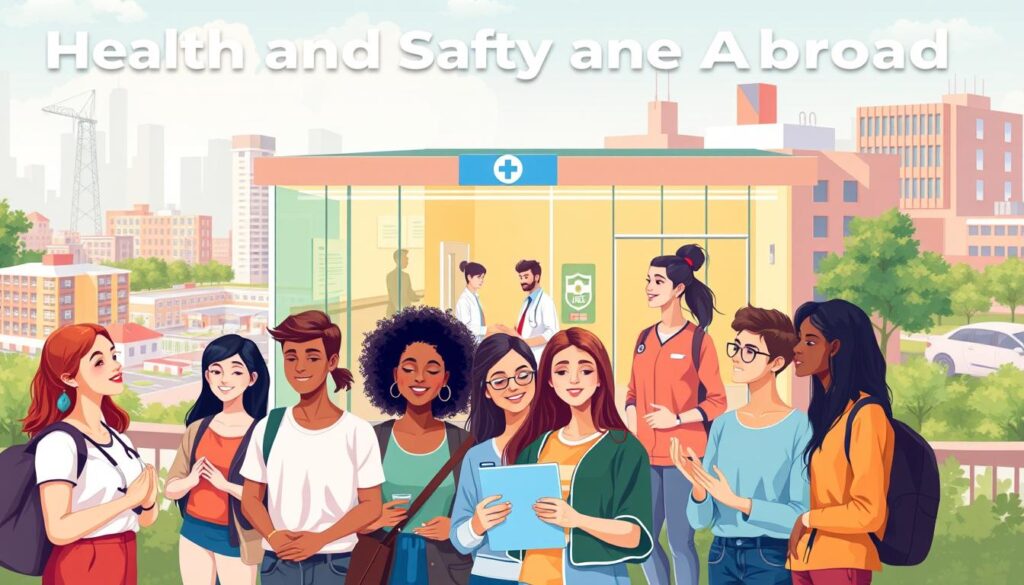Have you ever wondered what it’s like to study in a country rich with history and culture, yet filled with unique challenges? Embarking on this journey is both exciting and daunting. It’s a chance to grow academically and personally, but it also requires careful planning and adaptability.
Every student faces hurdles when stepping into a new environment. From managing finances to navigating cultural differences, the experience can be overwhelming. Early financial planning is crucial to avoid unnecessary stress. Practical preparations, like visa documentation and language readiness, also play a significant part in ensuring a smooth transition.
We’re here to guide you every step of the way. This comprehensive guide will help you make the most of your time abroad. Let’s explore how to thrive in this new chapter of your life.
Pre-departure Preparations for Studying in Russia
The key to a smooth transition to studying abroad lies in thorough pre-departure preparations. From securing the right documents to managing finances, every step matters. Let’s break down the essentials to ensure you’re ready for this exciting journey.
Visa Application and Documentation
Applying for a student visa is the first step in your journey. Start by gathering all required documents, including your passport, enrollment confirmation letter, and proof of financial stability. Ensure your documents are up-to-date and meet the specific requirements for an international student visa.
It’s also wise to confirm visa extension policies if you plan to stay post-graduation. Additionally, securing an enrollment confirmation letter can open doors to off-campus work opportunities. Review the visa specifics based on your course type and duration to avoid last-minute surprises.
Financial Planning and Budget Setup
Financial planning is crucial for a stress-free experience. Start by preparing a realistic budget that covers tuition fees and monthly expenses. Tuition fees in Russia range from $1,500 to $7,000 per year, while living costs average between $300 and $600 monthly.
Plan ahead to manage service costs and time limitations effectively. Consider setting aside funds for unexpected expenses. Proper fee management ensures long-term financial stability, allowing you to focus on your studies without unnecessary stress.
Adjusting to Russian Culture and Lifestyle
Adapting to a new culture is both a challenge and an opportunity for personal growth. Understanding local customs and social norms can make your experience more enriching. Let’s explore the key aspects of Russian culture and how to navigate them effectively.
Cultural Differences and Social Customs
Russian culture is deeply rooted in history and traditions. Unlike the vibrant and diverse customs of India, Russian social norms often emphasize formality and respect. For example, greetings are usually formal, with handshakes being common in professional settings.
Food habits also differ significantly. While Indian cuisine is known for its spices and flavors, Russian meals often include hearty dishes like borscht and pelmeni. Embracing these differences can enhance your study experience and broaden your perspective.
Understanding Local Etiquette
Respectful behavior is highly valued in Russian society. Simple gestures like removing your shoes when entering someone’s home or addressing people by their full names show politeness. Public behavior, such as queuing patiently and avoiding loud conversations, is also appreciated.
Understanding these nuances can help you build positive relationships. Many students find that adapting to local etiquette not only eases their transition but also opens doors to meaningful connections.
| Aspect | Indian Culture | Russian Culture |
|---|---|---|
| Greetings | Namaste or handshake | Formal handshake |
| Food | Spicy and flavor-rich | Hearty and mild |
| Social Norms | Warm and informal | Formal and respectful |
Embracing cultural differences is an essential part of your journey. It not only helps you adapt but also fosters personal growth. By understanding and respecting local customs, you can make the most of your time abroad.
Navigating Academic Life in Russia
Balancing academics and clinical practice in a foreign country can be both rewarding and challenging. The MBBS curriculum in Russia is designed to prepare you for both theoretical knowledge and practical skills. Understanding the differences and adapting to this system is key to your success.
Adapting to the MBBS Curriculum
The MBBS curriculum in Russia differs significantly from what you might be used to. It emphasizes a structured approach, combining classroom learning with hands-on clinical rotations. This blend ensures you gain both academic knowledge and practical experience.
To adapt, focus on understanding the teaching style. Professors often encourage independent study and critical thinking. Take advantage of additional workshops and tutoring services offered by your university. These resources can help you bridge any gaps in understanding.
Managing Study and Clinical Rotations
Balancing study loads with clinical rotations can be demanding. Start by creating a study routine that allocates time for both. Prioritize tasks and use campus facilities like libraries and study halls to stay focused.
Clinical rotations are an integral part of the program. They provide real-world experience and help you apply theoretical knowledge. Stay organized, take notes, and seek feedback from mentors to make the most of this opportunity.
| Aspect | Indian MBBS Curriculum | Russian MBBS Curriculum |
|---|---|---|
| Teaching Style | More structured | Independent study focus |
| Clinical Rotations | Limited in early years | Integrated throughout |
| Support Services | Basic tutoring | Workshops and additional tutoring |
Exploring various study options can also help. Whether it’s group study sessions or online resources, find what works best for you. For those considering affordable MBBS programs, Russia offers a comprehensive academic experience that combines quality education with practical training.
By embracing these strategies, you can navigate academic life effectively. Building a routine that balances studies and personal life will ensure a fulfilling experience in this new chapter.
Indian students in Russia survival guide
Staying healthy and safe while studying abroad is a top priority for every international student. It’s essential to plan ahead and be prepared for any situation. This ensures you can focus on your studies and enjoy your time without unnecessary stress.
Health, Safety, and Emergency Preparedness
Proactive health management is crucial. Start by familiarizing yourself with local healthcare services. Most universities have on-campus clinics for minor ailments, which can be a great first step.
Here are some tips to stay prepared:
- Create an emergency plan that includes quick access to help and funding.
- Keep an emergency kit with essentials like your passport, ID cards, medication, and a first-aid kit.
- Stay updated on local safety advisories and avoid crowded areas or protests.
Having a support network is also vital. Organize in small groups with peers for added safety and update each other regularly. For more tips on managing daily life abroad, check out this comprehensive guide.

Learning Basic Russian for Daily Interactions
Mastering the local language can significantly enhance your experience. Learning basic Russian phrases helps in daily interactions and boosts your confidence.
Here’s why it’s important:
- It makes communication with locals easier, from asking for directions to shopping.
- It shows respect for the culture and helps you integrate better.
- It can be a lifesaver in emergencies when you need to explain your situation.
Start with simple phrases like greetings, numbers, and common questions. Many universities offer language courses, or you can use apps to practice daily. This small effort can make a big difference in your independence and comfort.
By focusing on health, safety, and language skills, you’ll be well-prepared to thrive in your new environment. Remember, we’re here to help every step of the way.
Budgeting, Cost of Living, and Financial Support
Managing finances effectively is a cornerstone of a successful academic journey abroad. A well-planned budget helps you stay on track and avoid unnecessary stress. Let’s explore practical strategies to manage your expenses and make the most of available resources.
Tracking Expenses and Managing Tuition Fees
Creating a detailed monthly budget is essential. Start by listing your income sources, such as scholarships or part-time work. Then, outline your fixed expenses like tuition fees and rent, followed by variable costs like food and transportation.
Use digital tools or apps to monitor your spending. These tools can help you identify areas where you can cut back. For example, cooking at home instead of dining out can save you significant money over time.
When it comes to tuition fees, plan ahead. Many universities offer installment plans, allowing you to spread the cost over several months. This approach can ease the financial burden and give you more flexibility.
Utilizing Student Discounts and Local Services
Student discount cards, like the ISIC, can unlock savings on food, transportation, and entertainment. These cards are widely accepted and can make a big difference in your monthly expenses.
Take advantage of local services designed for students. Many cities offer affordable public transportation passes or discounted gym memberships. These options can help you save while staying active and connected.
Time management is also crucial. Aligning your spending habits with your academic demands ensures you stay focused on your goals. For more insights on cost-saving strategies, check out this comprehensive guide.
By carefully planning your finances and leveraging available resources, you can enjoy a stress-free and fulfilling experience abroad.
Finding the Right Accommodation
Finding suitable accommodation can significantly influence your academic success and personal well-being. Whether you choose to live in a dormitory or rent a private apartment, each option has its own set of advantages and challenges. Let’s explore the key factors to consider when making this important decision.
Dormitory Living
University dormitories are a popular choice for many students. They are often located close to campus, making it easy to attend classes and access university facilities. This proximity can save time and reduce transportation costs.
Living in a dormitory also fosters a strong sense of community. You’ll have the opportunity to meet peers from diverse backgrounds, which can enrich your social life and provide a support network. Shared living spaces, such as kitchens and common rooms, encourage interaction and collaboration.
However, dormitory living may come with some limitations. Privacy can be limited, and you may need to adapt to shared living conditions. Additionally, food options in dormitories are often basic, so you might need to prepare your own meals or explore nearby eateries.
Private Renting
Renting a private apartment offers more independence and flexibility. You can choose a location that suits your preferences, whether it’s closer to campus or in a quieter neighborhood. Private accommodations often provide more space and privacy compared to dormitories.
One of the main advantages of private renting is the ability to customize your living environment. You can decorate your space to reflect your personality and create a comfortable home. However, this option can be more expensive, and you’ll need to manage utilities and other expenses independently.
When considering private renting, it’s important to carefully review rental agreements. Look for clauses related to maintenance, security deposits, and lease terms. Negotiating these details upfront can help you avoid potential pitfalls later on.
| Aspect | Dormitory Living | Private Renting |
|---|---|---|
| Cost | More affordable | Higher cost |
| Proximity to Campus | Close | Varies |
| Privacy | Limited | More privacy |
| Community | Strong sense of community | Less community interaction |
| Food Access | Basic options | Full control over meals |
Ultimately, the right accommodation choice depends on your personal preferences and financial capability. Weigh the pros and cons of each option to find the best fit for your needs. Remember, your living environment can have a significant impact on your academic journey and overall experience.
Navigating Local Transportation and Connectivity
Navigating local transportation systems is essential for a seamless experience in a new city. Reliable connectivity and efficient transit options can make daily life easier and more enjoyable. Let’s explore how to stay connected and move around effortlessly.
Securing a Russian SIM Card and Internet Options
One of the first steps after arrival is securing a local SIM card. This helps avoid expensive roaming fees and ensures you stay connected. Major providers like MTS, Beeline, and Megafon offer affordable plans tailored for students.
When choosing a plan, consider your data needs. Many providers offer unlimited social media access, which is ideal for staying in touch with family and friends. For academic research, opt for plans with higher data limits to support online learning platforms.
Internet connectivity is equally important. Most universities provide Wi-Fi on campus, but having a reliable mobile data plan ensures you’re connected everywhere. Apps like Yandex.Metro and Google Maps can help you navigate the city efficiently.
| Provider | Plan Type | Data Limit | Cost (Monthly) |
|---|---|---|---|
| MTS | Unlimited Social Media | 10GB | $10 |
| Beeline | High Data | 20GB | $15 |
| Megafon | Unlimited Calls + Data | 30GB | $20 |
Public Transit Tips and Travel Cards
Public transportation is the backbone of city life in Russia. The metro system is extensive, affordable, and efficient. For students, travel cards like Podorozhnik offer significant savings on metro, bus, and tram rides.
Here are some tips to make the most of public transit:
- Purchase a monthly travel pass to save on daily fares.
- Use scheduling apps to plan your routes and avoid delays.
- Keep your travel card topped up to ensure uninterrupted access.
In some cases, universities provide discounted transit passes for international students. Check with your institution to see if this option is available. By planning your routes and using cost-effective travel cards, you can navigate the city with ease.
Reliable connectivity and efficient transportation are key to a stress-free experience. With the right tools and planning, you can focus on your studies and enjoy your time abroad.
Embracing Russian Culture Outside the Classroom
Exploring a new culture can transform your experience abroad into something unforgettable. Beyond academics, Russia offers a rich tapestry of arts, history, and traditions waiting to be discovered. Engaging with these elements not only broadens your perspective but also creates lasting memories.
Exploring Museums, Opera Houses, and Landmarks
Russia is home to some of the world’s most iconic cultural attractions. The Hermitage Museum in St. Petersburg and the Bolshoi Theatre in Moscow are must-visit destinations. These places offer a glimpse into the country’s artistic and historical legacy.
Here are a few tips to make the most of your visits:
- Plan ahead to avoid long queues, especially during peak seasons.
- Look for student discounts or free entry days to save on fees.
- Take guided tours to gain deeper insights into the exhibits.
Exploring these landmarks is not just about sightseeing; it’s a part of understanding the soul of the country.
Joining Student Associations and Cultural Groups
Becoming part of student associations or cultural groups can enhance your experience. These organizations often host events, workshops, and trips that introduce you to local traditions. They also provide a support network, helping you connect with peers who share similar interests.
In some cases, these groups collaborate with local communities to organize festivals or exhibitions. Participating in such activities allows you to immerse yourself in the culture while building meaningful relationships.
Cultural exploration is more than just a break from studies; it’s an opportunity to grow personally and academically. By stepping outside the classroom, you’ll gain a deeper appreciation for the world around you.
Conclusion
Embarking on a study abroad journey is a transformative experience that requires careful planning and adaptability. From pre-departure preparations to cultural immersion, this guide has highlighted essential steps to ensure a smooth transition. Practical planning in areas like budgeting, health, and academics is crucial for success.
Adapting to a new country is a gradual process that demands active participation. By embracing new experiences and utilizing the tips shared, you can make informed and confident decisions. Remember, every effort contributes to personal and academic growth.
We are committed to helping fellow international students overcome challenges and enjoy their time abroad. Whether it’s managing costs or navigating cultural differences, our goal is to support you every step of the way. For more insights, explore our guide on Studying MBBS in Russia.
Thank you for joining us as we navigated the ins and outs of this exciting journey. Your dedication and resilience will pave the way for a fulfilling and successful experience.




